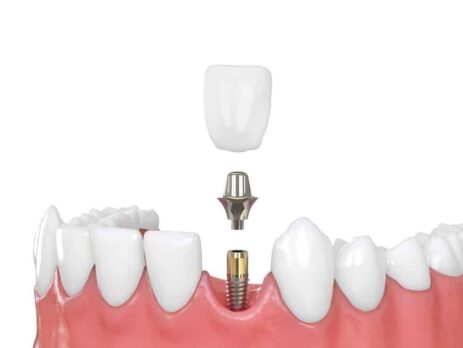What are dental implants?
Dental implants are the modern alternative to dentures and bridges. A dental implant consists of a titanium post (or screw) that is surgically positioned in your jawbone, thus enabling a direct rigid connection between a tooth (or multiple teeth) to your jaws. The tooth (crown) is custom designed to match the colour, size, shape and feel of your natural teeth.
This dental implant fuses or connects seamlessly with your jawbone through a process called osseointegration, whereby the bone cells stick onto the metal surface of the implant.
When it comes to tooth replacement, dental implants are often regarded as the preferred choice, since they re-establish your teeth closer to the way they were than any other treatment (compared to dentures and bridges). They are also easy to maintain (requiring no more effort than looking after your other teeth) and play an important role in helping to prevent ongoing jaw bone loss (bone resorption).
What are the benefits of dental implant treatment?
Dental implants provide many advantages. These advantages include:
Improved aesthetics – Because dental implants are similar to natural teeth in look and feel, they are an attractive option for people looking for a subtle replacement for their lost teeth.
Improved comfort – Dental implants offer superior comfort compared to many other replacement teeth options. For example, dental implants eliminate the discomfort and inconvenience of removing dentures. Since dental implants behave like your natura teeth, you can eat without worrying that your dentures will become loose, allowing you to eat your favourite foods without difficulty or pain.
Improved speech – Poor-fitting dentures can slip or shift inside the mouth when you are talking, resulting in mumbled or slurred speech and embarrassment. With dental implants, you can speak with confidence without fearing accidental movement.
Easier eating – Dental implants behave like your natural teeth, allowing you to eat your favourite foods without difficulty or pain.
Improved self-esteem – Dental implants may help bolster your self-esteem and give you a more confident smile.
Improved oral health – Dental implants allow for easier access between teeth for brushing and flossing, resulting in improved oral hygiene.
Durability – Designed to fuse with bone, dental implants are extremely durable and will often last for many years. If you practice good oral care, dental implants may even last a lifetime.
Is it painful to get a dental implant?
Is anaesthesia required?
No. As Specialist Surgeons, we can offer all of our patients the option to have the implant treatment performed either completely asleep (under general anaesthetic in hospital) or awake in our state of the art rooms (with local anaesthetic). Either way, the procedure is comfortable and takes about 40 minutes (on average) to complete.
Are bone grafts necessary for dental implants?
When a tooth is lost, jaw bone loss begins straight away, often resulting in the need to build up the bone to allow for implant placement. For this reason, your Specialist Surgeon will suggest placement of an implant at the same time as tooth removal (immediate implant placement), so that bone loss is minimal and your need for a bone graft is much less. Immediate implant placement is a highly specialised technique and also means that patients only need one procedure (and hence one recovery period needed, not two) to place th
Turkey Draem Smile, [08.07.21 20:30]
e implant.
Patients of the Dental Implant & Specialist Centre Specialist can also be reassured that any bone grafting procedures necessary are covered by Medicare rebates (independent of Health fund membership), thus reducing the treatment cost to you.
Patients with extreme or advanced bone loss can benefit from the use of zygomatic implants, which are another highly specialised implant treatment offered by our Specialist Surgeons.
What are the dental implant procedure stages and timeline?
Once a dental implant is placed in the jawbone, it needs 2-3 months for healing before it can be used to support a tooth.
When replacing teeth that are highly visible, it will be possible to attach a temporary tooth to the implant so that you are never without teeth during the healing phase of the implant. Occasionally, a temporary denture will be needed for the implant healing phase.
Generally, a single dental implant will take about 30-40 minutes to place. If you are having teeth removed at the same time or placement of multiple implants, your surgery may take longer than an hour. Implant placement can also be performed with you asleep in Hospital (under general anaesthetic).
Overall, the process of placing a dental implant will involve the following steps.
Stage 1 – Implant Placement (often in addition to tooth removal)
Anaesthetic – Numbing paste is applied to your gums, followed by a long-acting local anaesthetic, or you may be completely asleep (under general anaesthetic).
Damaged tooth removal + implant placement – Your Specialist Surgeon will remove your damaged tooth in a precisely controlled manner to allow for implant placement on the same day (immediate implant placement).
This highly technical procedure achieves two important things –
1. The amount of bone loss is minimal so the need for bone grafting is much less, making for a more comfortable recovery.
2. There is no need for a second procedure (to place the implant), so the patient only has one recovery period to manage.
Jawbone grafting + wound closure – If you need bone grafting, your Specialist Surgeon will often use a synthetic (completely safe) bone replacement product build up any deficient areas of the jawbone. Rarely, the bone graft will be anchored to your jawbone using titanium screws. Finally, the surgeon will reshape the gum tissue and formally close or suture (with dissolving stitches) the wound.
Patients of the Dental Implant & Specialist Centre benefit from Medicare rebates for this type of treatment, thus reducing overall treatment costs. Private Health Fund rebates are applicable as well.
Implant Healing Phase – Interim
Bone growth and implant healing – The bone adjacent to the implant matures and heals to become directly attached to the implant surface (osseointegration). This process has a 97-98% success rate.
Stage 2 – Implant Integration Assessment – Second procedure
Anaesthetic – Your gums will be numbed local anaesthetic.
Abutment placement – Your Specialist Surgeon will place an abutment (a small metal stud on the top of the implant) and test the implant’s connection to the jawbone. This confirms that the implant is a secure base for your new tooth or bridge.
3-Dimensional Scanning – The Dental Implant & Specialist Centre uses a state of the art intra-oral scanner (no more messy impression gums and goo to deal with!) to accurately capture (digital images) the position of the implant in your jaw and allow for the creation of your new tooth (or teeth). The process is fast and comfortable.
Stage 3 – Final Implant Retained Crown or Bridge insertion
Artificial tooth placement – 3-4 weeks after the 3-dimensional scanning was completed, the new artificial teeth (crowns or bridges) are ready to be finally attached to the implant(s). This procedure is pain-free (and doesn’t require any anaesthetic). The dental bite is checked and the patient is given instructions on how to care for their new implant retained teeth.
Stage 4 – Implant Maintenance Phase
The implants are checked by your Specialist Surgeon or Dentist on at least a yearly basis to ens
Turkey Draem Smile, [08.07.21 20:30]
ure they are healthy and being maintained to the best of the patient’s abilities.
How long does it take to recover from dental implant surgery?
For most patients, the recovery period will consist of 1-2 days, during which time you will experience local pressure discomfort that is readily controlled by scripted pain relief medications (provided at Stage 1 surgery). There is usually minimal visible swelling and rarely any bruising. After the second day, most patients are comfortable and not requiring any pain medications.
For the remainder of the implant healing phase (3 months), the implant is trouble free and not noticeably different to your own teeth.
What type of dental implants are available?
1. Root shaped (formed) implants are the most common type used for tooth replacement currently. Most implants are made from commercial grade titanium, but other materials (such as porcelain) have been found to be successful.
2. Zygomatic implants are used by Specialist Surgeons for patients that have extreme bone loss (resorption) affecting their upper jaw (maxilla). These implants can be used in various arrangements (from 2 to 4 implants) to support a variety of dental bridges by attaching directly to the cheek (zygomatic) bones.
1-2 Sessions
Number of Sessions
20 min.
Session Duration
Local anesthesia
Anesthesia
3-7 Days
Precision
Immediately
Back to Work
3-4 Weeks
Full Recovery
Continuous
Permanence
No
Hospitalization
Attention: *For informational purposes only, please consult your doctor for diagnosis and treatment.
For detailed information, you can contact us via WhatsApp.

